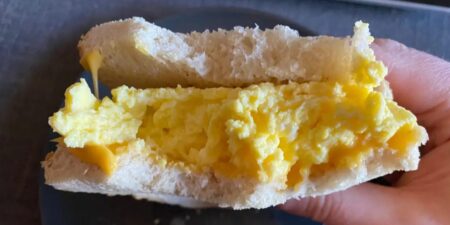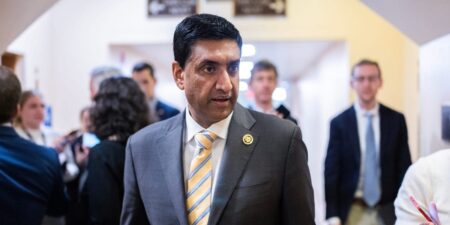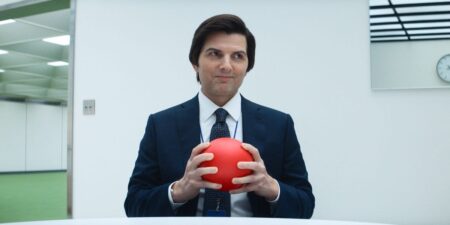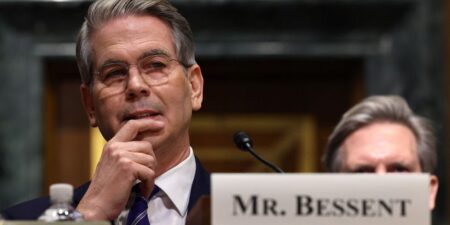AMC
- AMC’s “Breaking Bad” ended over 10 years ago, but its popularity and impact endure.
- The show’s iconic characters resulted in spinoffs, and it still has an enthusiastic fan base.
- From a character’s brush with death to flying pizzas, here are some surprising “Breaking Bad” facts.
When “Breaking Bad” debuted in 2008 on AMC, the gritty drama stunned viewers, especially those who knew Bryan Cranston as the goofy father from “Malcolm in the Middle.” His chemistry-teacher-turned-meth-maker character, Walter White, became increasingly ruthless as the series continued.
That wasn’t the show’s only surprise. Gruesome deaths, twisty plots, and memorable characters all made the show iconic, a legacy that continues over a decade after its end. “Better Call Saul” and a movie, “El Camino,” followed, continuing the interest and accolades for “Breaking Bad.”
Here are some fun facts about “Breaking Bad” you may not have known.
turtix/Shutterstock
Set in Albuquerque, New Mexico, the show used the stark, lonesome desert as the perfect place for hiding secrets — and stacks of cash. That wasn’t always the plan, though.
In a 2010 interview with Slant magazine, Vince Gilligan, the show’s creator, said he had originally planned for “Breaking Bad” to be set in Riverside, California.
Then Sony approached him with the idea of moving it to New Mexico because of financial incentives. The state offered tax credits for film and television production, Gilligan said.
They chose to film the show there “for strictly financial reasons,” he added.
However, the city’s proximity to the Mexico border ended up influencing storylines in later seasons. “I feel like I got very lucky that we wound up there, although it was not originally my decision,” Gilligan said.
Steve Snowden/Getty Images
It wasn’t just the plot that benefited from setting the show in New Mexico. Albuquerque saw a spike in visitors eager to explore Walter White’s haunts.
The show’s now-famous shooting locations continue to be a major draw for tourists from all over the world. Local souvenir shops sell “blue meth” rock candy, “Breaking Bad” t-shirts, and much more.
A website listing every known filming location in Albuquerque makes it easy for travelers to plan their “Breaking Bad” sightseeing trips.
Top sites include Walter White’s house; Saul’s office; and Twisters, the restaurant that served as the set for villain Gustavo Fring’s Los Pollos Hermanos.
Steve Snowden/Getty Images
The filming location for Walter White’s house in “Breaking Bad” became a must-see for tourists. For the occupants, the sensation around their modest three-bedroom home became so frustrating that they recently put it up for sale for $4 million.
For years, the family dealt with tourists taking rocks from the yard or tossing pizzas on the roof, just like Walter White did in a now-iconic scene from the show.
The owners hope whoever buys the house will embrace the show and its enthusiastic visitors. “I hope they make it what the fans want,” owner Joanna Quintana told KOB4, a local NBC affiliate, earlier this month. “They want a B&B. They want a museum. They want access to it. Go for it.”
AMC
During the second season of “Breaking Bad,” Walter White famously threw a pizza onto the roof of his home.
While the production team had set aside hours to get the shot, Cranston did it in a single take, he said in a 2012 interview on “Jimmy Kimmel Live.”
When fans saw an unsliced pizza swirl into the air and land perfectly on the roof, they wondered what pizza place sells uncut pizza.
In a 2017 Reddit AMA, Gilligan explained that he and the production team knew eagle-eyed fans would catch this, so they added a scene to explain the situation.
Badger and Skinny Pete show up at Jesse’s apartment with a pile of unsliced pizzas. “That’s the gimmick,” Badger said. “They don’t cut the pizza, and they pass the savings on to you.”
Ursula Coyote / AMC
The show reached out to the US Drug Enforcement Agency to get their input on the show. “But they saw that it might be in their best interest to make sure that we do it correctly,” Cranston told High Times in 2012. “So DEA chemists came on board as consultants and taught Aaron Paul and me how to make crystal meth.”
To become even more familiar with the science, Cranston met with the head of the University of Southern California chemistry department. The professor let the actor know they were using some equipment incorrectly, and Gilligan made the changes.
AP Photo/Tony Gutierrez
Walt and Jesse are shown throughout the series making methamphetamine in great detail. However, it’s not exactly a step-by-step recipe for viewers.
In a 2011 interview with NPR, Donna Nelson, an organic chemist and a science advisor to the show, said they eliminated key elements from the process to keep people from attempting to make meth at home.
“That was actually one of the concerns of a lot of people, but Vince Gilligan has been very clever,” Nelson said. “If you just simply followed the one synthesis as it’s presented, you wouldn’t come out with methamphetamine.”
Lewis Jacobs/AMC
In one of the first season’s most memorable scenes, Walt and Jesse used hydrofluoric acid to dissolve a body in a bathtub. In addition to dissolving the body, the acid ate through the tub and ceiling, cascading a massive, disgusting, gloopy mess onto the first floor.
“Mythbusters” tested the method on pig flesh in 2013. Although hydrofluoric acid broke down the tissue, it didn’t liquify it as thoroughly as the episode showed.
Meanwhile, the bathtub and drywall were relatively unaffected by the acid in the “Mythbusters” demonstration.
Tommaso Boddi/Getty Images
Initially, executives offered the role of Walter White to actors Matthew Broderick and John Cusack, The Hollywood Reporter reported in 2012.
Both declined, much to the dismay of executives at AMC and Sony Pictures Television who couldn’t get past Cranston’s history of comedic roles.
Gilligan pushed for casting Cranston as the antihero because he had witnessed the actor’s range in an episode of “The X-Files.” The role was very different from Cranston’s work on “Malcolm in the Middle” and “Seinfeld,” and his performance left a positive impression on Gilligan.
“We needed somebody who could be dramatic and scary yet have an underlying humanity so when he dies, you felt sorry for him,” Gilligan said of Cranston’s part on “The X-Files.” “Bryan nailed it.”
Gilligan showed executives the tapes of Cranston’s performance on the 1990s series, and the rest was history.
Ursula Coyote / AMC
While most aspects of the show are fictional, the creators took a few elements from real life.
Gilligan was talking to another writer, Tom Schnauz, who jokingly pitched an idea based on a news article he’d recently read about a man cooking meth in an RV, according to The Hollywood Reporter. Gilligan couldn’t get the image out of his head, he told Vanity Fair in 2010.
“The idea of it suddenly struck me as wonderful for a TV show because who would do such a thing?” he told The Hollywood Reporter. “And if he were indeed someone like us — meaning a couple of dopey middle-aged white guys — what would that look like?”
From there, Gilligan took inspiration from the Japanese movie “Ikiru,” a fictional story about a man diagnosed with cancer, he told NPR in 2019.
The name Heisenberg, Walt’s alias in the show, does come from real life, though. It’s a nod to German physicist and Nobel Prize winner Werner Heisenberg.
Ursula Coyote/AMC
Before the multi-Emmy-award-winning series found a home on AMC, some of the biggest networks passed on the show.
Reportedly, FX was afraid the show was too similar to its other series featuring male antiheroes. Another exec said the concept sounded a lot like Showtime’s “Weeds,” which was about a suburban woman who secretly grows and sells marijuana, according to Vanity Fair.
In 2011, Gilligan called his pitch meeting with HBO one of “the worst” he ever experienced.
“The woman we’re pitching to could not have been less interested — not even in my story, but about whether I actually lived or died,” he said.
“My agents could never even get her on the phone afterward to even say no,” he added.
Michael Burr/Invision for the Academy of Television Arts & Sciences/AP Images
For the character Gus Fring’s final scene, the makeup department and special-effects team had to create a realistic, half-blown-off face for actor Giancarlo Esposito.
To do so, the crew members from another hit AMC show, “The Walking Dead,” helped out.
“We did have great help from the prosthetic effects folks at ‘The Walking Dead'” Gilligan told The New York Times in 2011. “It’s a combination of great makeup and great visual effects. And it took months to do.”
Laura Radford/Marvel Studios
While filming “The Avengers” in New Mexico, Samuel L. Jackson hoped to make a cameo as his Marvel character. Nick Fury would casually enter Los Pollos Hermanos in costume, order food, and leave.
“I just wanted to order a three-piece and really freak people out,” Jackson told IndieWire in 2012. “Then people would be going, ‘Wow, was that him?'”
He said the producers of “Breaking Bad” weren’t interested.
http://www.savewalterwhite.com/
During the show’s first season Walter White’s son, Walt Jr., created a fundraising website called SaveWalterWhite.com to help pay for his dad’s cancer treatment.
Walter Sr. then used the website as a way to launder the money he made from selling meth by making consistent, anonymous donations to himself.
AMC runs the site, which you can still visit. Its “Click Here to Donate” button links to AMC’s own website.
Ursula Coyote / AMC
Fans may have heard that Gilligan planned to kill off Aaron Paul’s character Jesse Pinkman on the ninth episode of the show’s first season, but the 2007 writers’ strike meant only seven episodes ran.
As a result, Gilligan had time to reconsider killing off Jesse and ultimately keep him on the show. That isn’t quite the full story, Gilligan said on a panel in 2011.
“The writers’ strike, in a sense, didn’t save him,” he said. By episode two, he and the producers and directors all knew Aaron Paul was a great actor and that it “would be a huge, colossal mistake to kill off Jesse.”
Pinkman remained an integral part of all five seasons of the series.
AMC
In a 2013 Reddit AMA, Paul shared that he was knocked unconscious, got a concussion, and went to the hospital after a fight scene.
“Raymond Cruz who played Tuco gave me a concussion,” Paul wrote in the AMA. “Tuco takes Jesse and he throws him through the screen door outside, and if you watch it back you’ll notice that my head gets caught inside the wooden screen door and it flips me around and lands me on my stomach.”
Cruz continued the scene, thinking Paul was acting, kicking his costar then picking him up and throwing him over his shoulder. In reality, “I was pretty much unconscious,” Paul wrote.
In 2023, Cruz told The Mirror that Paul had some of the details wrong. “I’m actually the one who stopped it,” he said, explaining that he quickly realized the actor was hurt.
Viewers can see the moment that Paul was injured because that’s the shot featured in the show.
“It’s a crazy take because it’s so violent,” Cruz said. “The door ripped off its hinges.”
AMC
The season-two scene where Walt purposely watches Jesse’s girlfriend, Jane, die was the hardest moment for Cranston to film, he told IndieWire in 2018.
He said he pictured his own daughter choking as he watched Krysten Ritter act out her character’s death.
Once the director cut, Cranston said he was a “weeping mess.” He turned to the actor who played Skyler White, his TV wife, for comfort. “Fortunately, you have your family around you, and I went to Anna Gunn, and she held me,” he said.
AMC
Skyler’s sister, Marie Schrader, wears and owns a lot of purple items. Her go-to color was no accident, Gilligan told Vulture in 2011.
“Well, Marie would say purple is the color of royalty,” he said. The show often used color to portray certain energies and foreshadow certain fates.
“We always try to think of the color that a character is dressed in, in the sense that it represents on some level their state of mind,” he told the publication.
For example, Gilligan said Walter’s last name is White because it “is the color of vanilla, of blandness.”
Chris Williamson/Getty Images
On the final day of filming “Breaking Bad,” Cranston got a tattoo of the show’s iconic Br/Ba logo.
“We were having a couple of drinks at a bar, and they brought in a tattoo artist and we thought, ‘Why not? This is the time to do it,'” he told The Wrap in 2013.
The tattoo is hidden on the inside of his right ring finger. “So every once in a while I catch a glimpse of it and I see that logo from ‘Breaking Bad,’ and it makes me smile,” Cranston told E! News in 2013.
Ursula Coyote/AMC
During a 2016 interview with Seth Meyers, Paul said he took everything he could from the set of “Breaking Bad.”
One of the items was the faux severed head of Gus Fring, which Paul said he keeps in his media room.
The actor also took the license plate from Jesse Pinkman’s first car, and he has an iconic Heisenberg hat, he said in a 2013 interview with Entertainment Weekly.
This story was originally published on September 16, 2019, and most recently updated on January 17, 2025.
Read the full article here
















